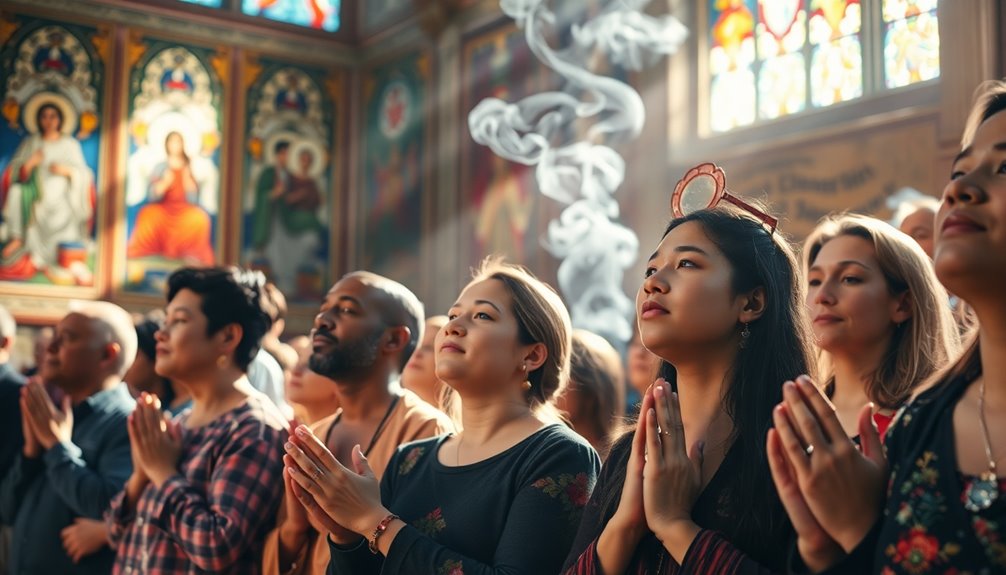Prayer's a direct line to the divine that strengthens your spiritual journey. It's an essential practice for personal growth, helping you connect with God while finding peace and guidance in daily life. Regular prayer can reduce anxiety, boost your mood, and even enhance life satisfaction. You can structure your prayers using methods like the ACTS model—adoration, confession, thanksgiving, and supplication. Throughout history, prayer has unified communities and supported movements, showing its cultural importance. If you're curious about how to enrich your prayer life and its different forms, there's much more to explore.
Key Takeaways
- Prayer is a direct communication with God, encouraged by Scripture to foster a deeper relationship and personal spiritual growth.
- Regular prayer is linked to reduced anxiety and depression, enhancing overall mental health and life satisfaction.
- The ACTS model (Adoration, Confession, Thanksgiving, Supplication) provides an effective structure for organizing prayers.
- Prayer has significant cultural and historical importance, reinforcing community bonds and supporting social movements.
- Daily gratitude reflections and group prayer activities enrich individual faith journeys through shared experiences and encouragement.
Introduction

Prayer is a vital practice for many believers, serving as a direct line of communication with God. Through prayer, you express your emotions, desires, and requests, making it an essential part of your spiritual journey. It can take different forms, whether audible, silent, private, or public, allowing you to connect with God in a way that feels genuine to you.
The Bible encourages prayer, with verses like 1 Thessalonians 5:17 urging you to "pray without ceasing." This highlights the importance of maintaining an ongoing conversation with God in your daily life.
One effective method is the ACTS formula—Adoration, Confession, Thanksgiving, and Supplication—which provides a structured way to articulate your thoughts and needs during prayer.
Engaging in prayer not only fosters a deeper relationship with God but also facilitates your personal spiritual growth. You'll likely find that regular communication with the divine enhances your sense of peace and provides guidance.
In essence, prayer is much more than just asking for help; it's a profound way to connect, reflect, and strengthen your faith.
Scriptural Insights on Prayer

When you look at Scripture, you'll find powerful insights on prayer that can shape your practice.
Verses like Philippians 4:6-7 and 1 Thessalonians 5:17 highlight both the importance of bringing your requests to God and maintaining a constant connection with Him.
As you explore these references, you'll uncover practical ways to enhance your prayer life.
Primary Bible References
Drawing on the wisdom of Scripture, believers find numerous insights about prayer that guide their communication with God. In Philippians 4:6-7, you're encouraged to present your requests with thanksgiving, assuring you that God's peace will guard your heart and mind. This promise highlights the importance of not just asking but also expressing gratitude in your Christian prayer.
1 Thessalonians 5:17 instructs you to "pray without ceasing," emphasizing that prayer should be a continuous dialogue. This encourages you to integrate prayer into every moment of your life.
Similarly, Matthew 7:7 reassures you that asking, seeking, and knocking will lead to receiving, finding, and having doors opened. It's a reminder that God is responsive to your prayers.
James 5:16 further emphasizes the power of prayer, stating that the prayer of a righteous person is powerful and effective.
Finally, the Lord's Prayer in Matthew 6:9-13 serves as a model for structuring your prayers, incorporating elements like adoration, confession, and supplication.
Together, these references provide a solid foundation for your Christian prayer life, guiding you in your relationship with God.
Secondary Bible References
Exploring secondary Bible references reveals additional insights that deepen your understanding of prayer. For instance, Philippians 4:6-7 encourages you to present your requests to God with thanksgiving. It promises that when you do, the peace of God will guard your heart and mind in Christ Jesus, reinforcing that your prayers can lead to inner tranquility.
In 1 Thessalonians 5:17, you're urged to pray continuously, highlighting that prayer isn't just a one-time act but an ongoing conversation with God.
James 5:16 emphasizes the power of your prayers, stating that "the prayer of a righteous person is powerful and effective," demonstrating how your prayers can bring about significant change.
Matthew 7:7 reassures you that asking, seeking, and knocking leads to prayers answered, reminding you of God's responsiveness.
Lastly, Romans 12:12 instructs you to be joyful in hope, patient in affliction, and faithful in prayer, illustrating how integral prayer is to your Christian life.
Together, these scriptures encourage you to engage deeply in prayer, trusting that your requests are heard and answered by God.
Ancient Prayer Practices Worldwide

Prayer has played a vital role in various ancient cultures, often reflecting their beliefs and practices through distinct rituals. You'll find that many ancient prayer practices involved specific physical postures, such as raised hands, kneeling, or prostration, which demonstrated the reverence and intent behind the act of praying.
For instance, the Kesh temple hymn, dating back to around the 26th century BC, stands as one of the oldest known prayers, highlighting prayer's historical significance in early civilizations.
In Ancient Egypt, the Pyramid Texts contained spells directed at deities, showing how prayer was deeply intertwined with rituals and their beliefs about the afterlife.
Meanwhile, Native American traditions often included communal dances as a form of prayer, emphasizing a connection to the earth and spiritual realms through collective expression.
Hindu practices have also embraced prayer through the chanting of mantras, which involves the repetition of sacred sounds believed to connect practitioners with the divine.
Each of these practices illustrates how prayer served as a powerful means of communication with higher powers, reflecting the diverse ways ancient cultures sought spiritual connection.
Cultural Significance of Prayer

The cultural significance of prayer transcends individual beliefs, deeply embedding itself in the fabric of communities across the globe. Across various religions, prayer serves as a vital means of communication with the divine, fostering bonds among believers. In traditions like those of Native Americans and Hindus, prayer isn't just a personal act; it's often a communal event involving rituals, chants, and even dancing.
You'll notice that cultural practices around prayer can differ widely. Some cultures emphasize fixed prayer times, while others embrace spontaneous expressions of faith throughout daily life. This flexibility reflects how prayer adapts to the needs and rhythms of different communities.
Historically, prayer has also been a powerful tool for social and political movements, offering hope and unity during challenging times. For instance, during the Civil Rights Movement in the United States, many found strength in prayer, drawing inspiration from figures like Jesus.
Despite the varying forms and expressions, the underlying purpose of seeking connection, guidance, and support from a higher power remains a common thread in human spirituality. This shared significance makes prayer a cornerstone of cultural identity and collective resilience.
Prayer's Impact on Mental Health

You might wonder if prayer really has any effect on mental health, especially with the skepticism surrounding it.
Contrary to common misconceptions, research shows that regular prayer can significantly reduce anxiety and depression.
Let's explore how prayer can enhance emotional well-being and coping mechanisms, even in challenging times.
Debunk Common Prayer Misconceptions
While many people may dismiss prayer as merely a ritualistic practice, research consistently shows it can have a profound impact on mental health. When you make requests to God, you're not just seeking answers; you're engaging in a process that can foster hope and purpose in your life.
Studies indicate that regular prayer can significantly reduce anxiety and depression, giving you a sense of peace and comfort. Engaging in prayer enhances your emotional resilience, helping you cope better with stress and difficult situations.
This connection with a higher power can be incredibly grounding, especially during challenging times. Moreover, prayer activates your parasympathetic nervous system, promoting relaxation and reducing physiological stress responses, which benefits your mental well-being.
A survey by the Pew Research Center found that 55% of Americans who pray regularly report feeling a strong sense of peace. Mental health professionals often recognize prayer as a valuable complementary practice to therapy, enhancing spiritual well-being and providing additional coping mechanisms.
Skepticism About Prayer's Effectiveness
Skepticism about prayer's effectiveness often arises from a desire for concrete evidence in a world dominated by scientific reasoning. Critics often point to the lack of empirical data as a reason to doubt prayer's impact on mental health.
However, research shows that prayer can lead to improved mental health outcomes, including reduced anxiety and depression. Engaging in prayer fosters a sense of connection and purpose, which contributes to enhanced emotional well-being.
A study published in the Journal of Health Psychology found that individuals who pray report higher life satisfaction compared to non-prayers. Furthermore, qualitative studies reveal that many find profound personal benefits from prayer, especially in coping with stress.
Prayer's physiological effects, such as the release of serotonin and dopamine, suggest a biological basis for its mood-enhancing properties.
While some argue that prayer might encourage passive coping strategies, proponents assert that it can motivate individuals to take proactive steps, increasing resilience and problem-solving abilities.
Ultimately, while skepticism about prayer exists, the evidence points to its potential as a valuable tool for mental health improvement.
Daily Prayer Journaling Practice

Incorporating daily gratitude reflections into your prayer journaling can transform your practice by helping you focus on the blessings in your life.
You might also consider joining group prayer gatherings, where sharing prayers and experiences can deepen your connection with others and enhance your spiritual journey.
Together, these elements can create a richer, more fulfilling prayer experience.
Daily Gratitude Reflection
Daily gratitude reflection in your prayer journaling practice can transform how you perceive your life's blessings. By regularly documenting what you're thankful for, you cultivate a mindset that recognizes the positive aspects of your day. This practice not only enhances your emotional well-being but also reduces stress as you shift your focus from challenges to the good in your life.
When you incorporate specific examples of gratitude, you deepen your connection with God, especially with Lord Jesus, reinforcing the habit of thankfulness. For instance, instead of writing, "I'm grateful for my family," you might specify, "Thank you, Lord Jesus, for the laughter shared at dinner last night." This specificity makes your gratitude more tangible.
Engaging in daily reflections fosters spiritual growth, as you acknowledge God's presence and provision. As you reflect, you may find that combining gratitude with other forms of prayer—like supplication or adoration—creates a richer, more fulfilling experience.
Ultimately, daily gratitude reflections can reshape your perspective, helping you appreciate the divine blessings that fill your life and drawing you closer to the heart of Lord Jesus.
Group Prayer Gatherings
Gathering in group prayer creates a powerful opportunity for believers to connect with each other and deepen their faith. These group prayer gatherings foster a sense of community, allowing you to share your needs and support one another in faith, as highlighted in Mark 11:17, which describes God's house as a house of prayer.
Engaging in corporate prayer can amplify your individual prayers; the collective faith of the group often leads to powerful experiences of God's presence and intervention, as suggested in James 5:16.
Integrating daily prayer journaling into your routine enhances this experience. By writing down your prayer requests and tracking God's responses, you deepen your understanding of His will in your life. It helps you maintain a record of your spiritual journey, document answered prayers, and express gratitude, aligning with 1 Thessalonians 5:17's encouragement to pray continually.
To enrich your group prayer experience, consider using structured formats like the ACTS model (Adoration, Confession, Thanksgiving, Supplication). This approach can help articulate your prayers more effectively and deepen your communal worship, ultimately bringing you closer to Jesus Christ and to each other.
Prayer Fosters Community Connections

Prayer serves as a powerful bond within communities, bringing people together through collective worship and shared faith. When you engage in prayer with others, you create a unifying force that fosters a sense of belonging, as highlighted in Mark 11:17. This collective worship encourages you to seek guidance together, strengthening your relationships and deepening your faith.
Participating in corporate prayer activities, like prayer meetings or events such as the National Day of Prayer, enhances spiritual support and encourages communal faith. Jude 1:20-21 emphasizes the importance of praying in the Holy Spirit, linking it to remaining in God's love. When you pray for one another, you fulfill biblical exhortations while cultivating a supportive network, especially for those facing challenges.
Moreover, prayer gatherings offer a platform for sharing testimonies and experiences, enriching your faith journey. This culture of encouragement and accountability empowers you and your community, creating lasting connections.
Ultimately, prayer not only deepens your relationship with God but also strengthens the ties among believers, fostering a sense of unity that can uplift and inspire everyone involved.
Additional Resources

Building on the sense of community fostered by collective worship, numerous resources are available to help you deepen your understanding and practice of prayer. The Billy Graham Evangelistic Association (BGEA) offers an array of tools, including articles and prayers for various occasions. By signing up for updates from BGEA, you'll receive spiritual encouragement and insights into Franklin Graham's initiatives, along with access to sermons and answers from Billy Graham himself.
To enrich your personal prayer life, consider exploring the Psalms, particularly chapters 25, 33, and 103, which provide a powerful guide for expressing your thoughts and emotions. The Lord's Prayer, found in Matthew 6:9-13, serves as a foundational model for structuring your prayers, emphasizing adoration, confession, and supplication.
Additionally, various online platforms and books are available to enhance your prayer practice. You might find it helpful to explore methods like the ACTS model (Adoration, Confession, Thanksgiving, Supplication) or to pray through scripture.
Incorporating philosophical exploration into your prayer practice can lead to deeper self-reflection and spiritual growth.
These resources not only clarify the definition of prayer but also provide practical methods to deepen your spiritual journey.
Frequently Asked Questions
What Is the Real Meaning of Prayer?
When you think about the real meaning of prayer, it's about connecting with something greater than yourself.
It's a chance for you to express your thoughts, emotions, and desires openly. You're not just talking; you're listening too, creating a dialogue that can deepen your understanding and faith.
Through prayer, you align your intentions with your beliefs, fostering personal growth and a stronger bond with the divine, whatever that may mean for you.
What Are the 5 Key Points of Prayer?
When you think about the five key points of prayer, consider the importance of adoration, confession, thanksgiving, supplication, and community.
You express love and reverence through adoration, acknowledge your faults in confession, and show gratitude in thanksgiving.
Supplication allows you to make requests for yourself and others.
Finally, engaging in community prayer fosters support and unity among believers, creating a stronger bond in faith as you collectively seek God's guidance.
What Is Prayer According to the Bible?
According to the Bible, you see prayer as a vital way to communicate directly with God.
It's your opportunity to express your emotions, desires, and needs, as emphasized in 1 Thessalonians 5:17.
You're encouraged to pray with gratitude and align your requests with God's will, as highlighted in Philippians 4:6-7.
The Lord's Prayer offers a structure for your conversations with God, incorporating adoration, confession, thanksgiving, and supplication.
What Is the Purpose of Prayer?
The purpose of prayer is to create a direct connection between you and God. It allows you to express your feelings, desires, and needs, fostering a personal relationship.
Through prayer, you align your will with God's, promoting spiritual growth. You can find peace and comfort, as it guards your heart and mind.
Additionally, prayer encourages community among believers, strengthening faith and providing spiritual support through collective experiences.










